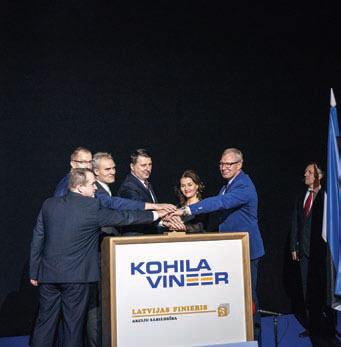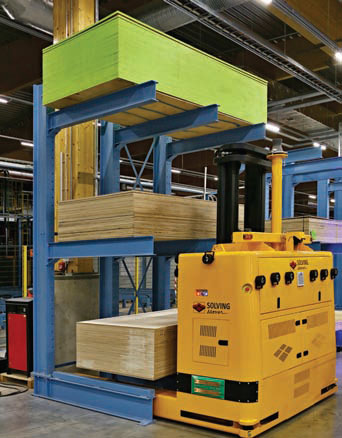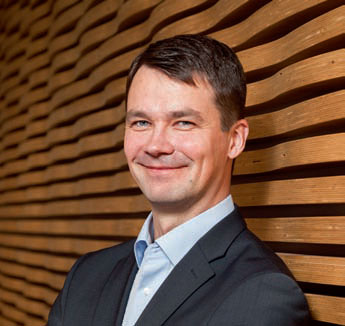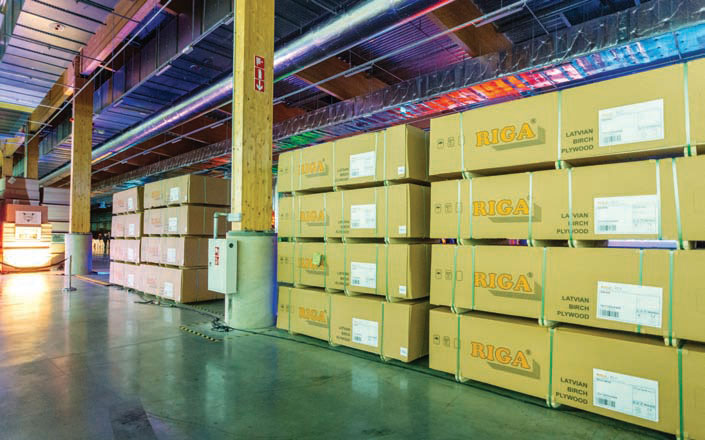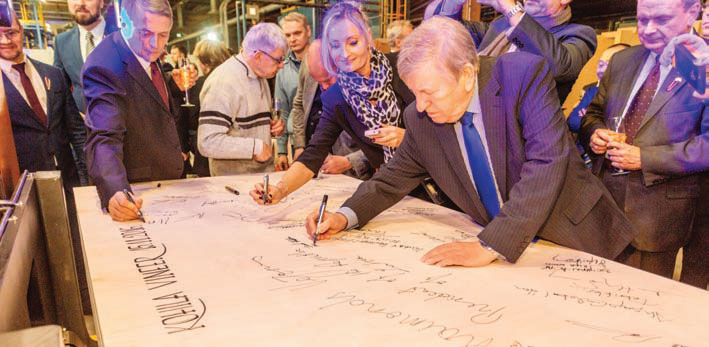Metsä Wood to Build Plywood Mill
15 February 2017Finland's Metsä Wood has signed a deal to purchase a land in Pärnu, Estonia, for a new plywood plant. Our Poland correspondent Jaroslaw Adamowski, reports
Metsä Wood’s new investment in Pärnu is estimated to be worth about €50m.
The land on which the new facility is to be built covers some 100,000m2 and about 200 new jobs will be created.
Jari Tikkanen, the senior vice president for production and technology at Metsä Wood, told WBPI that the project is part of the company’s industrial efficiency strategy which includes plans to boost Metsä Wood’s LVL and plywood operations. The programme includes a total investment of €100m in the Finnish and Estonian markets.
New Investments Under Way
"A new birch veneer peeling and drying line is planned for Ääne-koski, Finland, at the Metsä Group’s pulp and paperboard Industries’ mill site,” said Mr Tikkanen.
“Its veneer production will be processed at the new plywood mill to be constructed in Estonia. The existing birch plywood converting line at the Suolahti mill in Finland is to be transferred to Estonia. In October, Metsä Wood signed a preliminary agreement to buy the 10ha site in Pärnu."
According to Mr Tikkanen a final decision on the plant’s construction has yet to be taken, as the Finnish manufacturer is still considering another location in Estonia, in Tarto. The Estonian facility’s output will be sold on the global markets, he said.
Economy on Growth Path
With a population of slightly more than 1.3 million, Estonia is the smallest of the three Baltic States, its neighbours being Lithuania and Latvia, but of the three it has the most robust economy, with a gross domestic product (GDP) per capita of some €15.5bn in 2015, according to data from the country’s government.
Compared with 2009, this represents an increase of more than 47%, which indicates how fast the Estonian economy has been growing since the last economic crisis.
In 2009, the country’s GDP plummeted by 14.3%, alongside the other two Baltic States, but since then every year has brought an increase, allowing Estonia to halve the unemployment rate to 6.2% last year, and to raise the average monthly salary to €1,065.
Foreign direct investments, such as the one planned by Metsä Group, have been one of the main driving forces behind Estonia’s swift economic recovery and last year totalled a record €17.37bn.
"After having declined in the previous four quarters, the industrial sector’s value added grew by more than 4%," the staterun Statistics Estonia (ES) said in a recent analysis.
In the third quarter of 2016 Estonia’s GDP rose by 1.1% compared with the same period a year earlier, the report added. This was in line with the European Commission’s economic forecast for Estonia for that year.However, in 2017, the country’s economic growth is expected to accelerate to 2.3%, and to expand to 2.6% in 2018, according to Brussels.
Exports of goods and services are expected to contribute to the projected growth, as they are to expand by 2.7% this year and 3.3% in 2017. These again are figures from Brussels.
Since Estonia regained its independence in 1991 the country has maintained strong economic ties with the neighbouring Baltic States and Scandinavian countries. Last year, Estonia’s wood based products represented a significant share – some 9.9% – of its export sales, according to Statistics Estonia. Exports of local wood based output generated close to €1.15bn worth of products.
Industry Players Expand in Estonia
Meanwhile, Metsä Wood is not the only industry player that aims to invest in the Estonian market. As we reported year (WBPI June/ July 2016), Latvian plywood producer Latvijas Finieris AS announced plans to increase the workforce, and the output capacity, of its production facility there. The manufacturer is expanding the operations of the plant, located in Kohila, near Tallinn, by developing full-cycle production of plywood and related products. Latvijas Finieris’ Estonian subsidiary, Kohila Vineer OÜ, hired 39 new workers last year. In 2017, the company is planning to take on a further 110 employees at its factory.
The expanded production facility will be operated by an aggregate workforce of some 230. The expansion will bring Latvijas Finieris’ total investment at the Estonian plant to €80m since 2011, when Kohila Vineer was set up, the firm said.
In November, company representatives told local media that the second phase of the investment was completed, and the plywood plant now covers an area of close to 18,000m2. The upgraded factory has an output capacity of some 45,000m3 of plywood per year and it is expected to boost Kohila Vineer’s annual sales to some €40m, which would represent about 20% of the group’s aggregate annual revenues. Under the plan, the Estonian factory is to launch production at full capacity in early 2017.
In addition to its factory in Kohila, Latvijas Finieris is also active in Lithuania, Finland and its native Latvia, where it has also been developing its manufacturing capacity. A new production facility was opened in the country’s capital Riga last October. The investment was worth €10m, allowing the firm to double the plant’s output capacity. Latvijas Finieris’ plants are operated by a total workforce of about 2,500. It exports its products to more than 60 countries worldwide. In 2015, the company reported revenues of some €196.5m.
Plywood Production on the rise
Another major investment in the Estonian plywood industry was recently carried out by Finland’s industrial group UPM. The manufacturer completed work on expanding the capacity of its plywood mill in Otepaa, in the southern part of the country. The facility, upgraded under a project worth about €40m, now has a capacity of some 90,000m3 of plywood per year, according to senior company representatives. About 95% of this is intended for export sales, mostly to various countries in central Europe.
"The investments now completed take the Otepaa mill to the world class of plywood mills. As a result of the increased production capacity, the mill will be better able to respond to the growing demand for high-quality plywood products," said Mika Sillanpää, the executive vice president of UPM Plywood, as reported by local news site Baltic-Course.com.
The project has increased the plant’s workforce by 40 employees bringing the total to 240. The group also operates production facilities in Finland and Russia. In total, the Finnish manufacturer employs some 2,400 workers in the three countries where it is active.
Returning to Metsä Wood, in addition to its planned investment in the Estonian market, the company’s expansion strategy also includes plans to launch a new softwood based speciality product at an annual volume of approximately 60,000m3. Production will be at its Suolahti mill in Finland, according to Mr Tikkanen.
"A final investment decision will be made at a later stage. Furthermore, the annual production capacity of the Kerto LVL mill in Lohja, southern Finland, is planned to be increased by 20,000m3 by replacing two older production lines with one new line," the company representative said.
Metsä Wood plans to implement the investment programme in steps by the end of 2018, and expects to better meet the globally growing demand for its products – and to improve its competitiveness as a result, said Mr Tikkanen.
Metsä Wood is the wood products branch of Finland’s forest products group Metsäliitto, specialists in producing timber, plywood, LVL and other products. With production carried out at 15 facilities, with a total workforce about 2,000, the manufacturer says that, while Europe is its primary market, its has global growth targets, in particular in Asia and North America.
The company’s sales revenues for 2015 were €852m, and its operating profit totalled €30m.
